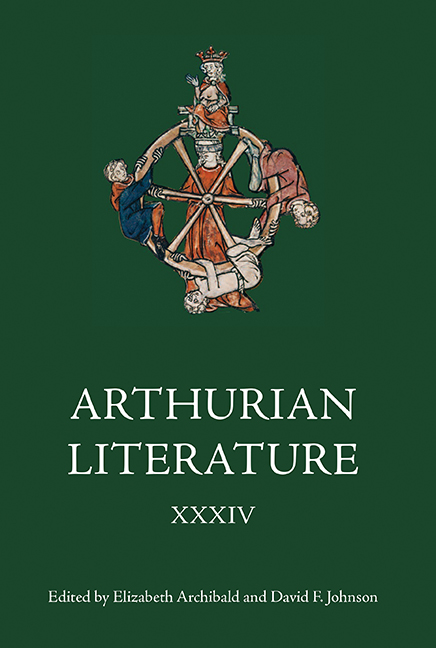Book contents
- Frontmatter
- Contents
- List of Illustrations
- General Editors’ Foreword
- List of Contributors
- I Illusory Ends in Chrétien de Troyes’ Erec et Enide
- II Who is the Traitor at the Beginning of Sir Gawain and the Green Knight?
- III Sir Gawain's Death and Prophecy in Malory's Morte Darthur
- IV Late Medieval Irish Kingship, Egerton 1782, and the Irish Arthurian Romance Eachtra an Mhadra Mhaoil (‘The Story of the Crop-Eared Dog’)
- V ‘Which I have beholden with most curiouse eyes’: The Lead Cross from Glastonbury abbey
- VI The Arundel Coronatio Arthuri: A Middle English Sword in the Stone Story from London, College of Arms MS Arundel 58
- Arundel Coronacio Arthuri
- Appendix I Linguistic Profile For Aca
- Appendix II Select Glossary
- Contents of Previous Volumes
IV - Late Medieval Irish Kingship, Egerton 1782, and the Irish Arthurian Romance Eachtra an Mhadra Mhaoil (‘The Story of the Crop-Eared Dog’)
Published online by Cambridge University Press: 17 July 2019
- Frontmatter
- Contents
- List of Illustrations
- General Editors’ Foreword
- List of Contributors
- I Illusory Ends in Chrétien de Troyes’ Erec et Enide
- II Who is the Traitor at the Beginning of Sir Gawain and the Green Knight?
- III Sir Gawain's Death and Prophecy in Malory's Morte Darthur
- IV Late Medieval Irish Kingship, Egerton 1782, and the Irish Arthurian Romance Eachtra an Mhadra Mhaoil (‘The Story of the Crop-Eared Dog’)
- V ‘Which I have beholden with most curiouse eyes’: The Lead Cross from Glastonbury abbey
- VI The Arundel Coronatio Arthuri: A Middle English Sword in the Stone Story from London, College of Arms MS Arundel 58
- Arundel Coronacio Arthuri
- Appendix I Linguistic Profile For Aca
- Appendix II Select Glossary
- Contents of Previous Volumes
Summary
Unlike medieval Wales, the birthplace of the legend of King Arthur, medieval Ireland – according to conventional wisdom – paid little attention to Arthurian tales. The native Irish Arthurian material that survives is late and limited. It consists largely of a group of five late medieval and early modern Irish Gaelic prose Arthurian romances, of which the tale known as Eachtra an Mhadra Mhaoil (‘The Story of the Crop-Eared Dog’), composed in the fourteenth or fifteenth century, is the oldest. Yet Eachtra an Mhadra Mhaoil is preserved in sixty-seven known manuscripts, indicating that it was of great interest to an Irish audience. Bernadette Smelik has recently explored the popularity of the Irish Arthurian romances as a group, concluding that their blend of ‘foreign and native elements’ suggests likely circulation among the Gaelicised English in Ireland. This article offers a more specific explanation for the popularity of Eachtra an Mhadra Mhaoil by treating the learned Ó Maoil Chonaire family, who produced the earliest surviving manuscript containing this tale (London, British Library, Egerton 1782, written in 1517), as a case study of its audience during the Gaelic resurgence. I argue first that the mutilations of the crop-eared dog and the tale's portrayal of Arthur are related to medieval Irish traditions about legitimate kingship which still possessed cultural currency in the sixteenth century, and second, that the broader contents of Egerton 1782 indicate the Ó Maoil Chonaire family's interest in this topic, which may have had contemporary political resonance. The Ó Maoil Chonaire family deliberately cultivated a backward look as they compiled Egerton 1782, and Eachtra an Mhadra Mhaoil's concern with native Irish kingship demonstrates that the world of narrative could sustain this ideology and its concomitant symbolism even when they no longer found a place in the world contemporary with the manuscript, its creators and the composition of the Eachtra itself. Eachtra an Mhadra Mhaoil's Arthurian framework allows the tale to engage with these concerns at a time when they may have been culturally, but not historically, relevant.
This article moves from the centre of Eachtra an Mhadra Mhaoil outwards.
- Type
- Chapter
- Information
- Arthurian Literature , pp. 69 - 87Publisher: Boydell & BrewerPrint publication year: 2018

